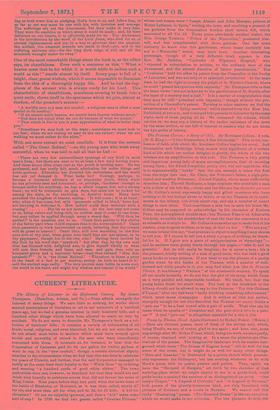CURRENT LITERATURE.
The History of Leicester in the Eighteenth Century. By James Thompson. (Hamilton, Adams, and Co.).—Time affects strangely the interest of many things. We care little or nothing for works which seemed masterpieces of literature or art to our ancestors of a hundred years ago, but we feel a genuine interest in their butchers' bills, and a hundred other things which have been allowed to reach us only by accident. We do not mean to describe Mr. Thompson's book as a col- lection of butchers' bills ; it contains a variety of information of all kinds, social, religious, and even historical, but we are not sure that we do not attach most value to matters which must have seemed quite trivial and unworthy of record to the men who were immediately concerned with them. It interests us, for instance, to hear that the Corporation of Leicester paid 69. 8d. per gallon for twelve gallons of wine to run in the "new conduit," though a certain historical dignity attaches to the circumstance when we find that this was done to celebrate the peace of Utrecht, and further, that the said Corporation managed to testify at the same time their loyalty to the " White Rose" by ordering and wearing "a hundred yards of good white ribbon." The town authorities were not, however, so fanatical but that they would eat and drink very heartily to celebrate events that did not favour the cause of King James. Nine years before they had paid, when the news Came of the battle of Blenheim, or Hochsted, as it was then called, nearly £7 for ale, and more than £3 for wine, and 6s. 3d. for 25 kids. A kid for threepence! Or are we culpably ignorant, and does a "kid" mean some
sort of cup In 1730 we find two guests called "Grecian Princes," whose real names were "Joseph Abaisir and John Henmer, princes of Mount Lybanns, in Syria," visiting the town, and receiving a present of ten guineas from the Corporation besides their tavern bill, which amounted to £2 Ils. 3d. Three years afterwards another visitor, the Hon. George Toniison, "Prince of the Muscovites," presented him- self, and was complimented with three guineas. One has some curiosity to know who this gentleman, whose name certainly has not a Muscovite" sound, may have been. Another interesting personage, though of a very different kind, appears in the Rev. Mr. Jackson, " Confrater of Wigston's Hospital," who "objected to subscription to articles, to the ordinary view of the Atonement, and the eternal duration of future punishments." The "Confrater "held his office by patent from the Chancellor of the Duchy of Lancaster, and was not subject to episcopal jurisdiction. At the same time, he hid the right to occupy the pulpit of St. Martin's Church, where he could "preach his opinions with impunity." Mr. Thompson tolls us that the same views "are not unknown to the parishioners of St. Martin, after the lapse of a century and a half." It is a matter of congratulation that they may be still preached with impunity," though without the pro- tection of a Chancellor's patent. Turning to other matters, we find the advertisement of a 'flying machine," which started from the Rain Inn, Smithfield, at two a.m., and conveyed four persons to Leicester by the same night, each of them paying £1 5s. We commend the volume, which carries on, we may say, a history of the earlier existence of the town by the same author, as one full of interest to readers who do not scorn the bye-paths of history.


































 Previous page
Previous page